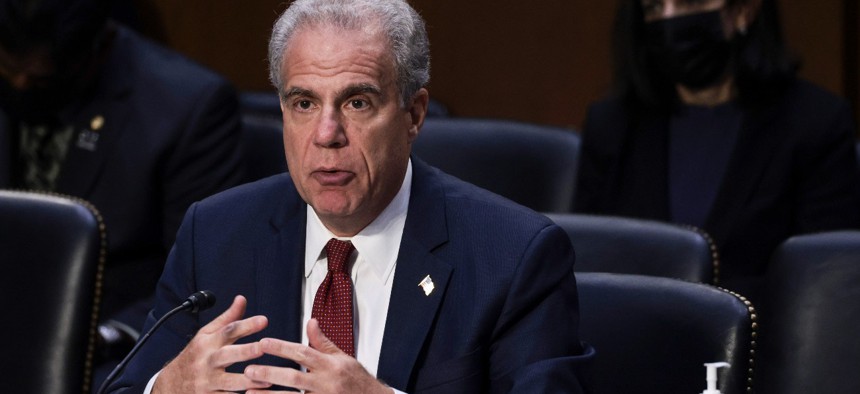
Anna Moneymaker/Getty Images
Federal Officials Discuss How to Make COVID Oversight More Effective
One advocated for an update to the False Claims Act, which was enacted in 1863.
The head of a pandemic watchdog testified on Thursday that an update to a Civil War era law could help his team better fight fraud and build on their success over the past two years.
Over the past two years, Congress has approved over $5 trillion in COVID-19 relief. The White House is pressing for more after a COVID-19 supplement was stripped from the fiscal 2022 omnibus and is warning of the severe consequences if Congress doesn’t come to an agreement on it. Meanwhile, four federal officials testified before the Senate Homeland Security and Governmental Affairs Committee on Thursday in a hearing that reflected on the last two years of spending and oversight on coronavirus relief and programs.
“I do think we’ve been very effective in addressing this herculean task,” said Michael Horowitz, chair of the Pandemic Response Accountability Committee. “As you know when we were created back in March 2020, we were only overseeing about $2 trillion of federal funds, it grew to over $5 trillion.” Although he acknowledged did have some challenges in accessing full data and spending information from agencies as outlined in several of the committee’s reports.
The membership of the committee – one of the three oversight entities established by the CARES Act – consists of IGs from across the government. Horowitz, who is also the Justice Department inspector general, said IGs are tasked with overseeing 426 pandemic relief programs across more than 40 agencies. The work of the committee and its partner IGs have led to 1,272 indictments and complaints, 949 arrests, and 455 convictions, he added.
When asked by Sen. Gary Peters, D-Mich., committee chair, what more he needs to be successful, Horowitz said enactment of the bipartisan 2021 Administrative False Claims Act “would make a difference.”
The False Claims Act, originally enacted in 1863 during the Civil War, allows ordinary individuals to file lawsuits on behalf of the federal government in attempts to identify fraud. Sen. Chuck Grassley, R-Iowa, a longtime advocate for whistleblowers and oversight, said last year, during the pandemic the law is more important now than ever.
“Too often those who fraudulently divert tax dollars in amounts below what is typically accepted by prosecutors are not fully held accountable, impacting agency programs and leaving the taxpayer footing the bill,” said Horowitz in his prepared opening statement. “The legislation raises the jurisdictional limit for administrative recoveries of ‘smaller’ false or fraudulent claims against the government from $150,000 to $1,000,000.” If enacted, the modification “would extend the [committee] and the inspector general community’s ability to use this fraud-fighting tool to recover pandemic-related funds for the taxpayers.”
The proposed law was previously endorsed by various government accountability groups, such as Empower Oversight, Government Accountability Project, National Security Counselors, National Whistleblower Center, Project on Government Oversight, Public Employees for Environmental Responsibility and Whistleblowers of America.
Another hearing witness, Jason Miller, deputy director for management at the Office of Management and Budget said “cross-cutting efforts and capabilities enabled by the [Pandemic Response Accountability Committee] warrant consideration for ongoing capabilities and it’s a model for future oversight of major investment initiatives.” Miller also serves as the chair of the President’s Management Council and executive chair of the Council of the Inspectors General on Integrity and Efficiency.
The two other witnesses also shared suggestions and needs for more effective oversight for the COVID-19 pandemic as well as future emergencies.
Gene Dodaro, comptroller general of the United States and head of the Government Accountability Office, said “shortcomings” on internal controls and financial and fraud risk management practices “were exacerbated by already existing problems in financial management of the federal management,” especially since the government has a “serious improper payment problem.” GAO estimated that from fiscal 2003 to fiscal 2021, the total government-wide improper payments totaled $2.2 trillion.
Dodaro provided 10 suggestions to Congress on how it can address these issues, one of which includes requiring the Office of Management and Budget to give agencies guidance to develop internal controls that can be implemented immediately for emergency funding in the future and agencies to report their plans to OMB and Congress.
Larry Turner, Labor IG whose office has been investigating the massive fraud in COVID-19 unemployment insurance programs, said a challenge his office faced was “a lack of direct access to [unemployment insurance] data,” from states. The IG office had to issue subpoenas to get this information, which he said took months and delayed their oversight efforts early on. Therefore, he outlined remedies for Congress and the Labor Department to facilitate this going forward.







